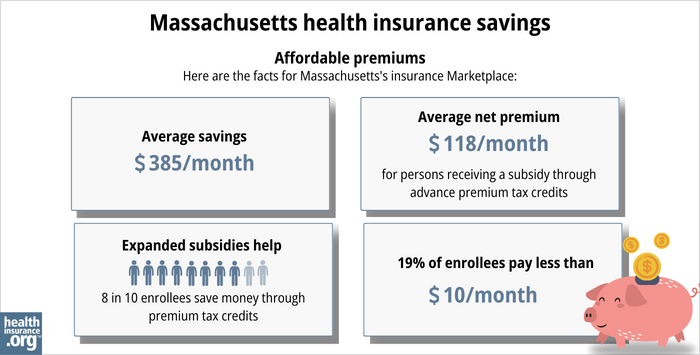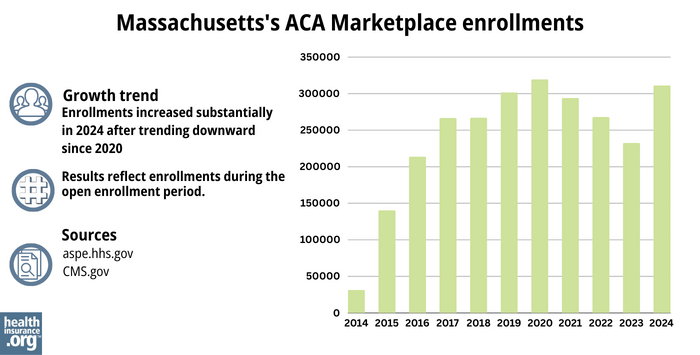

This guide was created to help you better understand the health coverage options available to you and your family in Massachusetts. The options found in Massachusetts’s ACA Marketplace may be a good choice for many consumers, and we will guide you through the options below.
Massachusetts residents use a fully state-run health insurance marketplace known as Massachusetts Health Connector to obtain ACA Marketplace plans offered by various private health insurance companies.

Hoping to improve your smile? Dental insurance may be a smart addition to your health coverage. Our guide explores dental coverage options in Massachusetts.


Learn about Massachusetts' Medicaid expansion, the state’s Medicaid enrollment and Medicaid eligibility.


Use our guide to learn about Medicare, Medicare Advantage, and Medigap coverage available in Massachusetts as well as the state’s Medicare supplement (Medigap) regulations.


Short-term health plans provide temporary health insurance for consumers who may find themselves without comprehensive coverage. Learn more about short-term plan availability in Massachusetts.

To purchase health coverage through the Massachusetts Marketplace, you must: 4
Eligibility for premium subsidies and cost-sharing reductions through the Marketplace depends on your income and how it compares with the cost of the second-lowest-cost Silver plan in your area. In addition, to qualify for financial assistance with your Marketplace plan you must:
It’s important to note that Massachusetts is one of the states that has its own individual mandate, and residents who don’t have health insurance are subject to a penalty when they file their state tax returns. 9 The individual mandate in Massachusetts pre-dates the ACA. It was paused from 2014 through 2018, when there was a federal penalty for not having health insurance. Massachusetts revived the state-based penalty in 2019.
The open enrollment period for individual/family health coverage in Massachusetts runs from November 1 to January 23. This is slightly longer than in most states. 10
Outside of open enrollment, a qualifying life event is generally necessary to enroll in a plan or make coverage changes. But residents who are eligible for ConnectorCare can enroll anytime if they are newly eligible or haven’t previously enrolled. 11
Massachusetts also has a “Simple Sign Up Program” that allows people to use their state tax return to gain access to health coverage. 12 Several other states have similar programs.
To enroll in an ACA Marketplace plan in Massachusetts, you can:
The Massachusetts Health Connector debuted a program for automatic enrollment in 2022. It allows applicants to check a box on the application indicating that if they are eligible for a $0 premium ConnectorCare plan but don’t select a plan themselves, the exchange will automatically enroll them in a $0 premium plan. If the applicant had coverage in the past with a carrier that offers one of the available $0 premium plans, the exchange will enroll the person with that carrier. If not, and if multiple $0 premium plans are available, the exchange will randomly assign the person to one of the available plans. But applicants in this scenario have the option to select a different plan instead of the one to which they’re automatically assigned. 14
The federal government reported that 1,568 people who previously had MassHealth coverage had been automatically enrolled into a qualified health plan by the Massachusetts Health Connector between April and June 2023. 15
R esidents in Massachusetts use the Health Connector to enroll in Marketplace health coverage as well as to determine subsidy eligibility. Both non-standardized and standardized health plans are available through the Health Connector. 16
The Affordable Care Act provides income-based advance premium tax credits (subsidies) that offset premium payments to help keep your expenses down. About 80% of Massachusetts Health Connector enrollees saved money on 2024 premiums. The average subsidy for these enrollees was $385/month, resulting in an average after-subsidy premium of $118/month. 17
In addition to federal subsidies, Massachusetts residents may also qualify for additional subsidies via the ConnectorCare program. ConnectorCare plans qualify for the federally funded ACA premium tax credits, but are also subsidized by the state, resulting in even lower premium and out-of-pocket costs for eligible residents. 18
ConnectorCare was historically available to applicants with income up to 300% of the poverty level. But starting in 2024, ConnectorCare eligibility was expanded to 500% of the poverty level. 19
ConnectorCare enrollment has been steadily increasing since mid-2023, due to the post-pandemic return to normal eligibility redeterminations and disenrollments for MassHealth (Medicaid). Many people who are no longer eligible for MassHealth are now eligible for ConnectorCare instead. 20 And the expansion of eligibility to 500% of the poverty level also helped to drive ConnectorCare enrollment to record-high levels for 2024. 21
ConnectorCare plans are offered by the same insurers that offer other QHPs via MA Health Connector. There are seven plan variations available , access to each plan depends on the applicant’s income. The premiums range from $0/month (for those with income up to 150% FPL) to $255/month (for those with income between 400% and 500% FPL). 22

Eight insurers offer exchange plans in the Massachusetts exchange. 24 Coverage areas vary from one insurer to another, so plan availability depends on where you live. All eight insurers have filed proposed rates and plans for 2025. 25
There are also two insurers — HPHC Insurance Company and ConnectiCare of Massachusetts, Inc. — that only offer plans outside the exchange. However, their combined total enrollment in individual/family plans in 2023 was fewer than 450 people. 26
For 2025, ConnectiCare did not file rates, meaning they may not be planning to continue to offer coverage. HPHC Insurance Company did file for 2025, but has only 234 enrollees in the individual market in 2024. 25
The following average rate changes have been proposed for 2025 by the insurers that offer Marketplace plans in Massachusetts. The overall average proposed rate increase is 8.4%, and the proposed rates are under review by the Massachusetts Division of Insurance: 25
Source: Massachusetts Division of Insurance; Office of Consumer Affairs and Business Regulation 25
Because Massachusetts has a merged individual and small-group market, each carrier’s rate changes apply to both individual and small-group plans.
For perspective, here’s a summary of how average premiums have changed in Massachusetts over time:
During the 2024 open enrollment period, 311,199 people enrolled in a health plan through the Massachusetts exchange. 37
This was the highest enrollment had been in Massachusetts since 2019 (see chart below). The enrollment increase was driven by the continued enhancement of subsidies under the American Rescue Plan and Inflation Reduction Act, Massachusetts’ decision to extend ConnectorCare eligibility to 500% of the federal poverty level (up from 300% in previous years), 21 and the “unwinding” of the pandemic-era federal Medicaid continuous coverage rule.
According to a CMS report, more than 72,000 Massachusetts residents transitioned from MassHealth to a Marketplace plan through Massachusetts Health Connector between April 2023 and February 2024, due to the “unwinding.” 38

Source: 2014, 39 2015, 40 2016, 41 2017, 42 2018, 43 2019, 44 2020, 45 2021, 46 2022, 47 2023, 48 2024 49
State Exchange Profile: Massachusetts
The Henry J. Kaiser Family Foundation overview of Massachusetts’s progress toward creating a state health insurance exchange.
Health Care for All – Massachusetts Consumer Assistance Program
Assists people insured by private health plans, Medicaid, or other plans in resolving problems pertaining to their health coverage; assists uninsured residents with access to care.(800) 272-4232
Office of Patient Protection, Department of Public Health
800-436-7757 (toll-free nationwide)
Serves residents and other consumers who receive health coverage from a Massachusetts carrier, insurer, or HMO.
Louise Norris is an individual health insurance broker who has been writing about health insurance and health reform since 2006. She has written dozens of opinions and educational pieces about the Affordable Care Act for healthinsurance.org.